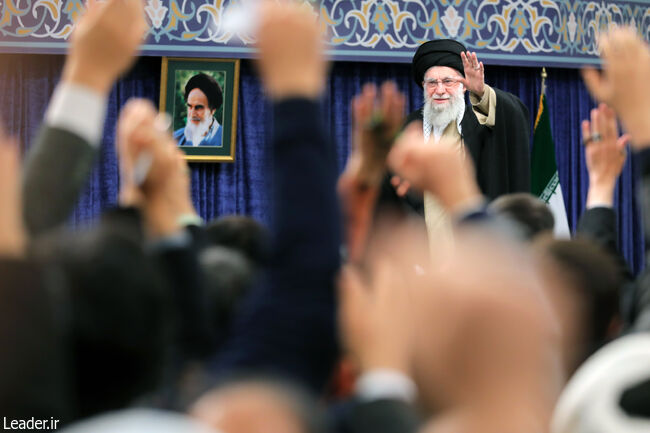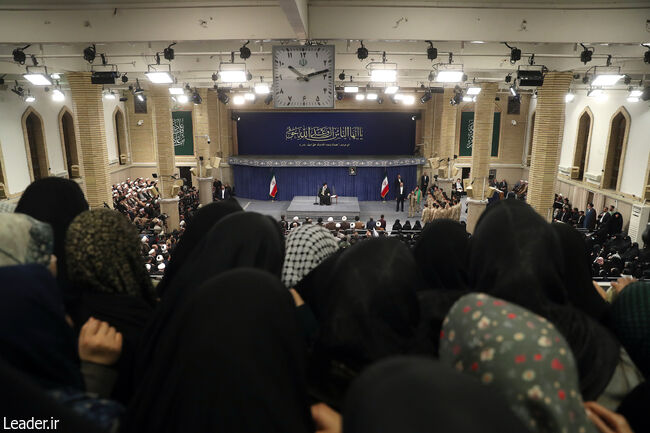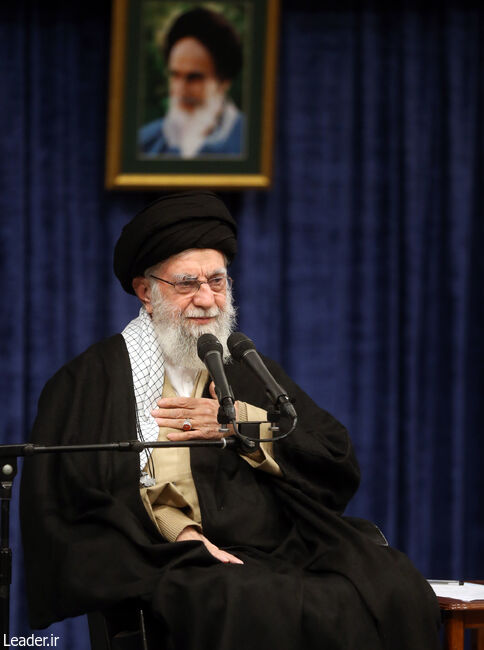This morning, commemorating the anniversary of the January 9th, 1978, uprising of the people of Qom, the Leader of the Islamic Revolution met with thousands of city residents. He spoke about the 46 years of flawed U.S. policies and miscalculations about the Iranian nation as a continuation of misjudgements in analysing the historic January 9th uprising. Stressing the need to draw lessons from that event, he pointed out that today, there is a serious need for media and online activists to make "unceasing, extensive, and effective" efforts to "tear apart the illusion of enemy power and safeguard public awareness." He also called for officials to focus entirely on serving the nation's interests in every economic and cultural decision-making and action. He said, "Everyone must carry on the national movement toward achieving economic and non-economic goals with hope and increased effort."
Ayatollah Khamenei described the January 9th uprising of the faithful and courageous people of Qom as a significant moment in the nation's history. Like all "Days of Allah," it is full of many lessons and insights. He said, "The most important lesson of that day is that it reveals what kind of Iran America desires and dreams of."
The Leader of the Revolution spoke about the visit of then-U.S. President Carter to Tehran on December 31st, 1977, his insincere praises of Mohammad Reza Shah and his description of the Pahlavi-era Iran as an "island of stability." He said, "Iran of 1977, which Carter deemed desirable to America, was utterly subservient to the U.S. in foreign policy and fulfilled its interests. In domestic policy, it was marked by severe suppression of all opposition that even extended to differing perspectives about the regime. Despite enormous oil revenues, it was economically divided by deep-rooted class inequalities. It was backwards in science and technology, and culturally, it was a country where Western corruption, immorality, and decadence were spreading daily.
Ayatollah Khamenei said, "The January 9th uprising wrested the Iran desired by the Americans from their grasp. However, America still dreams of that Iran—a dream which, just as Carter took to his grave, other Americans will also take to theirs."
He said that the second lesson of the January 9th uprising was to expose America's miscalculations, proving their inability to understand the realities of Iran.
The Leader of the Revolution added, "Those who are captivated by America's appearances and forget the greatness of God and the Iranian nation should note that only nine days after Carter's praise of the so-called 'island of stability,' the uprising of the pioneering people of Qom revealed just how backward and oblivious America is in understanding Iran's realities." He likened the victory of the Islamic Revolution as emerging from the "most important stronghold of arrogance," to the nurturing of Prophet Moses (a.s.) in Pharaoh's palace. He added, "The Americans were caught off guard, and the great Islamic Revolution arose from the heart of their fortress of interests, just like Pharaoh was oblivious to the fact that Prophet Moses was growing and being nurtured in his own home."
Ayatollah Khamenei pointed to the continued miscalculations of America's policy apparatus regarding Iran over the past 46 years and added, "Those who are intimidated by American policies should not be. They should pay close attention to the U.S. regime's fundamental and ongoing weakness."
The Leader of the Revolution explained some of the flawed and futile U.S. policies toward the Iranian nation. Pointing to the issue of sanctions, he said, "They aimed to cripple Iran economically through sanctions, but instead, the Iranian nation achieved its greatest progress in science and technology under them, and its motivated youth rose to the challenge in various fields."
He added, "Of course, sanctions caused harm to the country, but they failed to achieve their objectives. God willing, one day, the Iranian nation will hold them accountable for this harm as well ."
Ayatollah Khamenei described the victory of the Revolution as a crack in the concrete wall of arrogance and a shaking of the Western fortress. He added, "Another lesson of the January 9th uprising is that we must safeguard public awareness against enemy propaganda."
He stated that the purpose of an insulting article against Imam Khomeini published in one of the newspapers in January 1977 was a result of the soft power tools leveraged by the Americans and the Pahlavi regime. He said, "They sought to silence the Dhu'l-Fiqar of Imam Khomeini's words, which inspired hope and warmth in people's hearts from beside the sacred shrine of Amir al-Mu'minin (AS). However, with their vigilance and distrust of American and Pahlavi propaganda, the people of Qom thwarted that effort."
Referring to the exponential increase in the use of propaganda tools by the Americans to solidify the outcomes of their hard-power actions, the Leader of the Revolution said, "In Gaza, they massacred tens of thousands of people, yet they could not eliminate the Resistance with hard-power. In Lebanon, they martyred individuals like Sayyid Hassan Nasrallah and other commanders, but Hezbollah has not been destroyed and will not be destroyed."
Ayatollah Khamenei deemed explanations and advocacy a significant benchmark and stated, "The enemy strives to influence public opinion using fabrications and other methods to create a gap between reality and the public's thoughts and perceptions. Today, the national broadcasting system, the Ministry of Culture and Islamic Guidance, and every cultural and informational institution and online activist must tear apart the illusion of enemy power and protect public opinion against its lies, threats, and distortions."
Pointing out that the essence of arrogance has not changed from the past, the Leader of the Revolution said, "No one should think that today's America and the Zionist regime are different from those of the past. Of course, their methods and tools have become a thousand times more diverse and widespread, and in response, we must also act with a thousand times more vigilance and precision."
He emphasised the necessity of safeguarding public opinion and added, "The key is not to believe the enemy's words. We must recognise that what the enemy presents in its propaganda to influence public opinion is deceptive and false, and we must immediately reject it."
In another part of his remarks, Ayatollah Khamenei described Iran as having international strategic importance because of its valuable blessings, such as natural resources, a human workforce more advanced than the global average, and its favourable geographic location and sensitive geopolitical position. He said, "For about 80 years, for several decades, Iran belonged to America, but the Islamic Revolution wrested the country away from America's grip. This is why their bitterness over the Revolution remains unforgettable for them."
He referred to the remarks of some individuals questioning why the Islamic Republic, despite maintaining relations with European countries and hosting their embassies in Iran, is unwilling to negotiate or establish relations with the United States. He said, "Before the Revolution, Iran was under America's control, but the Islamic Revolution wrested that immense political and economic wealth from American hands. Therefore, their grudge against the Revolution is profound and enduring, which is very different from the stance of European countries."
The Leader of the Revolution described America's failure to reclaim Iran, despite its heavy expenditures over the past 46 years, as another reason for its deep-seated grudge against the Iranian nation and the Islamic Republic. He added, "America has been defeated in this country and seeks to compensate for that defeat; therefore, it shows its enmity toward the Iranian people in every way it can."
Ayatollah Khamenei stated that one of the demands of U.S.-led global arrogance upon all nations, including the officials of the Islamic Republic, is to consider their interests and concerns in planning various affairs. He emphasised that yielding to this unreasonable expectation from America threatens democracy and the republican nature of governance in the country. He stated, "The people have elected officials to serve their interests, not those of America. Therefore, decision-makers in matters such as inflation, production, currency, and cultural issues, including hijab, must focus solely on the interests of the Iranian nation and the Islamic Republic. They should in no way consider the interests of America and the Zionists, as they are deeply hostile to our nation and the Islamic Republic, and their ultimate desire is the destruction of Iran."
The Leader of the Revolution expressed satisfaction with the clear, firm, and courageous stance of the President against the Zionist regime and America's support for Zionist crimes, saying, "This position brought joy to the hearts of the people."
Ayatollah Khamenei emphasised the importance of keeping the issue of hope alive in the face of the enemy's efforts to demoralise the youth. He stated, "We must place our hope in divine guidance and assistance, as well as in the God-given strength of nations. The primary goal of all those active in the field of advocacy and those who have a voice should be to revive hope in hearts and to avoid expressing discouraging words."
He cited the late Imam's message from Najaf after the January 9th uprising, in which he gave glad tidings of victory to the Iranian nation, as an example of the Imam's great emphasis on the importance of hope. He remarked, "Who could have believed at that time, when the Imam foretold the victory of the movement, that the Revolution would succeed and a powerful and trailblazing entity like the Islamic Republic would emerge in this area of the world, standing against many of the West's aggressions and malicious goals? And who could have believed that a day would come when the American flag would be set ablaze in Western countries and even Washington?"
According to experts and those familiar with the realities (of economics), the Leader of the Revolution described the outlook for the country's economic issues as promising. He added, "Some people consider policies such as achieving 8% economic growth impossible. However, at the recent exhibition by economic activists, which the President also visited, it was stated and proved that achieving 8% growth was possible without reliance on external sources. The President also reiterated the statements of those activists and experts."
He said that effort and perseverance are essential for hope to bear fruit and added, "With hope and diligence, we must provide the necessary means for the country's progress."
Ayatollah Khamenei concluded his remarks by emphasising that regional events, including those in Syria, must not overshadow the issue of Palestine. He said, "The core of resistance lies in standing firm against the malicious actions of the Zionist regime."
He emphasised the need for the Resistance to remain alive and grow stronger day by day, stating, "We support the Resistance in Gaza, the West Bank, Lebanon, Yemen, and anywhere that stands against the Zionist regime."



